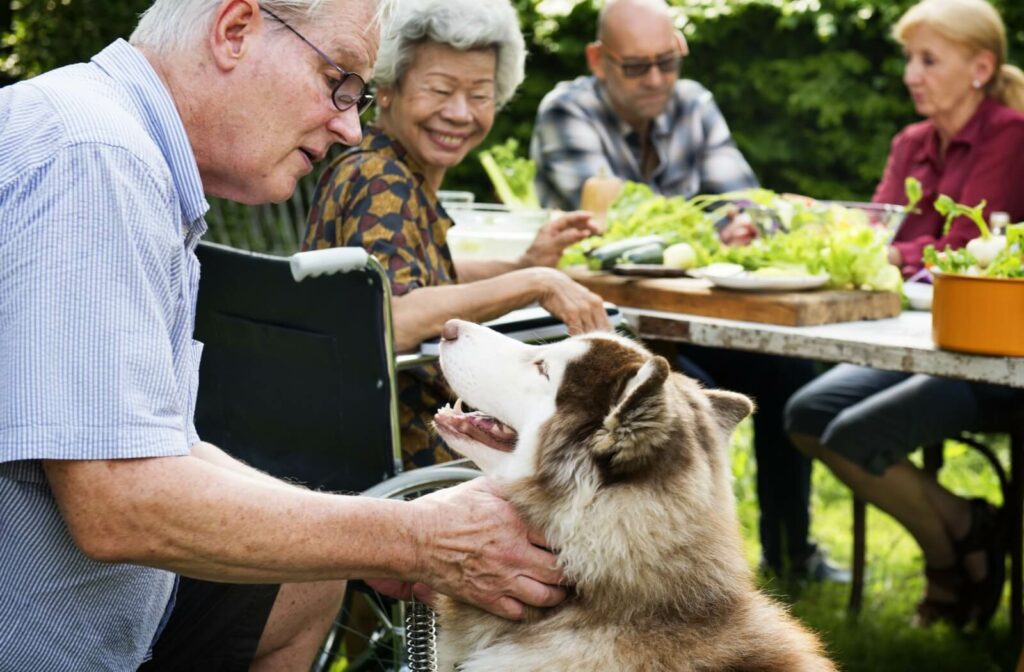As people age and transition into assisted living communities, companionship becomes increasingly important for an individual’s well-being. Pets can provide older adults with not only companionship but also a sense of purpose and responsibility.
However, selecting the right pet for older adults in assisted living requires careful consideration to make sure of a suitable match for both the loved one and their living environment.
Dogs and cats would seem to be some of the obvious choices for the best companions in assisted living, however, there are many other possible animals to consider, some of which may be easier to care for and fit better within a given community!
At Landmark Crossing at Southgate, we embrace pets as part of the family. Just a little reminder, though—before you bring your pet over, please have a word with our team. We want to make sure that we can accommodate your companion while still providing top-notch care for you or your loved one.
Choosing the Best Pet for Assisted Living
Some factors to consider when choosing the best pet for older adults in assisted living are:
Allergies
Allergies are a significant concern for many, with over 50 million people in the US affected, as reported by the American Veterinary Medicine Association. Among these individuals, 24 million suffer from asthma, which can be exacerbated by pets.
While allergies pose challenges, they are manageable with appropriate medical care. Professionals in veterinary and animal care fields have developed effective strategies to mitigate allergic reactions, emphasizing the importance of being vigilant about potential allergies within your household and among visitors.
It’s important to note that the concept of a completely nonallergenic dog is a myth. However, certain dog and cat breeds are identified as “low-allergen” due to their minimal shedding. For those with severe allergies, alternative pets such as birds, reptiles, fish, or short-haired rodents may be more suitable.
Living Requirements
The living requirements and needs of pets vary significantly; cats, dogs, birds, small furballs, reptiles, and fish all need their own kind of space to thrive. Cats crave spots to hide and perch, dogs need room to play and companionship, birds love roomy cages and toys, little critters like rabbits and hamsters want space to explore, reptiles need a habitat that mimics their natural environment, and fish thrive in clean tanks with plenty of room. Making sure they’ve got what they need keeps them happy and healthy.
Creatively adapting your living space to meet the needs of your pet ensures a harmonious cohabitation.
Your lifestyle
The benefits of pet ownership extend to both physical and mental health, yet it requires a substantial commitment. Making sure that your pet receives adequate exercise, regular veterinary care, training, and socialization is important.
Your lifestyle will have an impact on what pet is right for you–if you’re an outdoorsy person who isn’t home much, you might want to consider getting a more active dog rather than an animal that requires more maintenance such as a reptile, bird, or rabbit. However, if you’re looking for a cuddly stay-at-home pet, your options are more open. You should still take into consideration that some animals are awake during the nighttime, or active at dawn and dusk, so if your home is smaller or you’re a light sleeper, you may want to opt for one that rests when you rest.
Age of Your Pet & Your Age
The age of the animal you’re considering can make a huge difference in the kind of work you’re signing up for. If you’re thinking about a puppy or kitten, they’re adorable, but remember, they require a ton of attention and training. On the other hand, an adult pet might be a bit more laid back and could be just the companion you’re looking for.
Another thing to consider is the lifespan of the pet. It’s vital to be prepared for the long-term commitment, which includes the emotional and financial responsibilities of caring for an elderly or sick pet down the line. It means being prepared to say goodbye someday.
Personality & Temperament
It’s really important to meet the pet before making any decisions. This way, you can get a sense of their personality and energy level to see if it matches you. After all, you want to make sure you’re both a good fit for each other.
When it comes to where you adopt from, going through reputable humane organizations or rescue groups is key. This not only makes sure that you’re not inadvertently supporting puppy mills but also gives you peace of mind knowing the pet has been well cared for.
Financial Responsibility
Finally, don’t forget about the costs involved in pet care. It’s a good idea to explore options for assistance with veterinary care if needed, as this can help manage the financial aspect of pet ownership.
Pet Policies
Before choosing a pet, older adults should check with their assisted living community to understand their pet policies and any restrictions on size, breed, or species. Some communities may have limitations or require additional fees for pet ownership.
It’s noteworthy that emotional support animals and service animals have legal protections, allowing them to reside in properties that typically prohibit pets.
Benefits of a Pet For Older Adults
There are a number of benefits to owning a pet, especially for older adults:
- Decreases loneliness and boredom
- Getting more exercise, enjoying more company, and reducing loneliness
- Lowers blood pressure
- Decreases anxiety, depression, and pain
- Better heart health
- Help with developing a more resilient immune system
- Helps with heightened abilities to form social connections

Finding Furry Friends in Assisted Living
Ultimately, the best pet for older adults in assisted living varies depending on individual preferences, abilities, and living arrangements. Whether it’s a furry friend, a feathered companion, or a scaly buddy, the right pet can bring joy, companionship, and a sense of purpose to older adults in their golden years.
With careful consideration and planning, older adults can find the perfect pet to enhance their quality of life in assisted living. Landmark Crossing at Southgate accepts most animals within our community, understanding the benefits and companionship they provide our residents. We encourage you to get in touch with our team to find out more about our community and see if it’s right for you!


